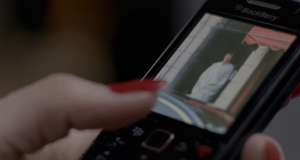Being an outsider within Neptune High’s social hierarchy gives Veronica Mars a perspective that enables her to be a good detective. Because of her fall in popularity and trauma as a rape victim, Veronica is able to have the invisibility and freedom that is required of a good detective. Her independence enables her to find an end that “justifies the means”(Burnnett, Townsend) by manipulating people without being noticed.
In the first scene, Wallace Fennel is taped to a flagpole with the words “Snitch” written across his chest. In most situations, the average teenager would consider it to be “social suicide” to assist the bullied. Instead, Veronica Mars breaks the social norm and helps untie Wallace. Due to her father’s job loss and Veronica’s status as an outsider, she does not have anything to lose socially and can easily free Wallace. In addition to this, her actions are of little surprise and significance to the rest of Neptune High’s pupils because she is low on the social hierarchy. Veronica Mars is able to go under the radar. Due to her ability to stand up to the population of Neptune High and save him, Wallace is in debt to Veronica, which gives Veronica more power. She uses his alliance in future scenes.
With the help of Wallace, she is able to obtain evidence of Weevil and another PCH biker stealing alcohol. Again, who would suspect a teenage girl with little social status to have the bravery and intelligence to trick a police station that mocked her when reporting a crime? Veronica would not have been able to pull this off without Wallace’s help with the remote control. Her ability to obtain the evidence tape is key to acquiring the partnership of the PCH biker gang. Again, Veronica Mars uses her intelligence and lack of social status to manipulate people into assisting her when needed.
Veronica Mars is able to uphold a confidence and independence that allows her to manipulate people and to be a good detective. She is able to maintain a lone wolf personality and be a strong individual through her survival of rape, and her ability to be invisible in society. She proves she has what it takes to achieve what she wants although most of society would believe she is incapable due to her social status and victimization. Veronica remains ahead of the game and in control of those who are in debt to her. She is not just another teenage outcast.




